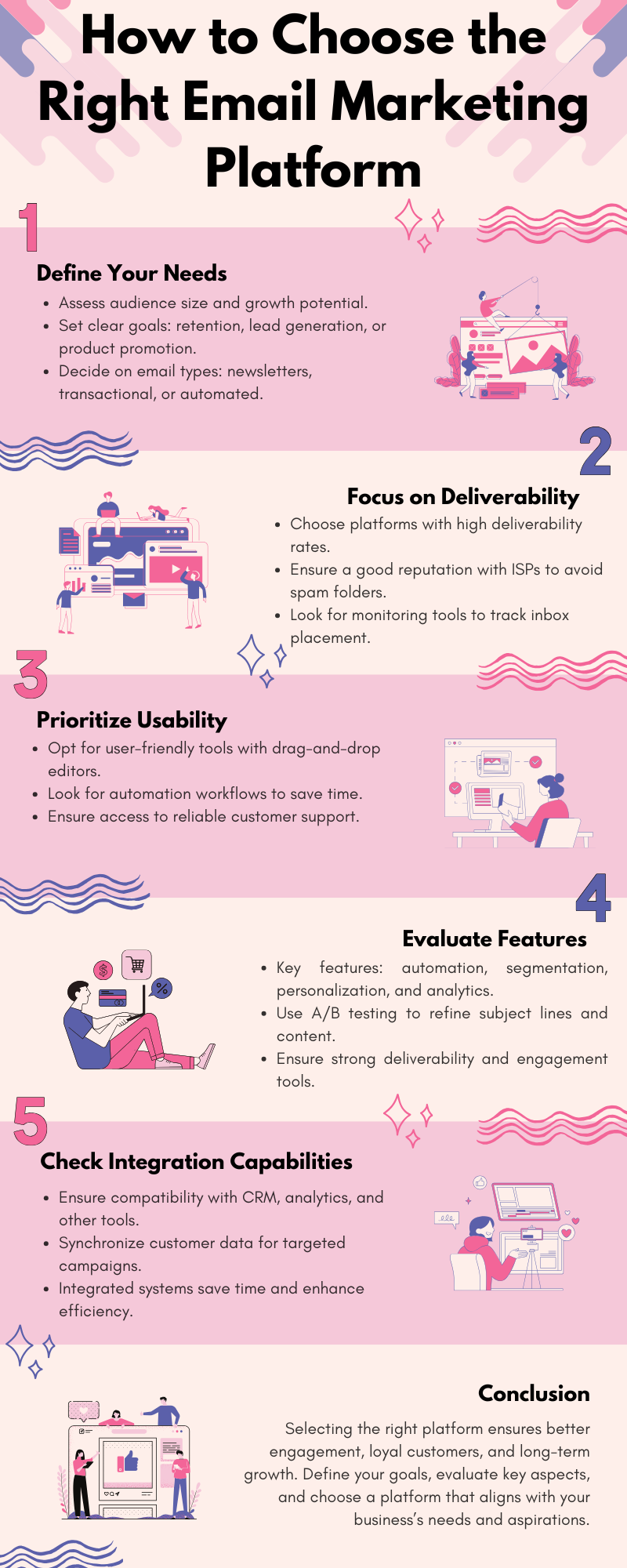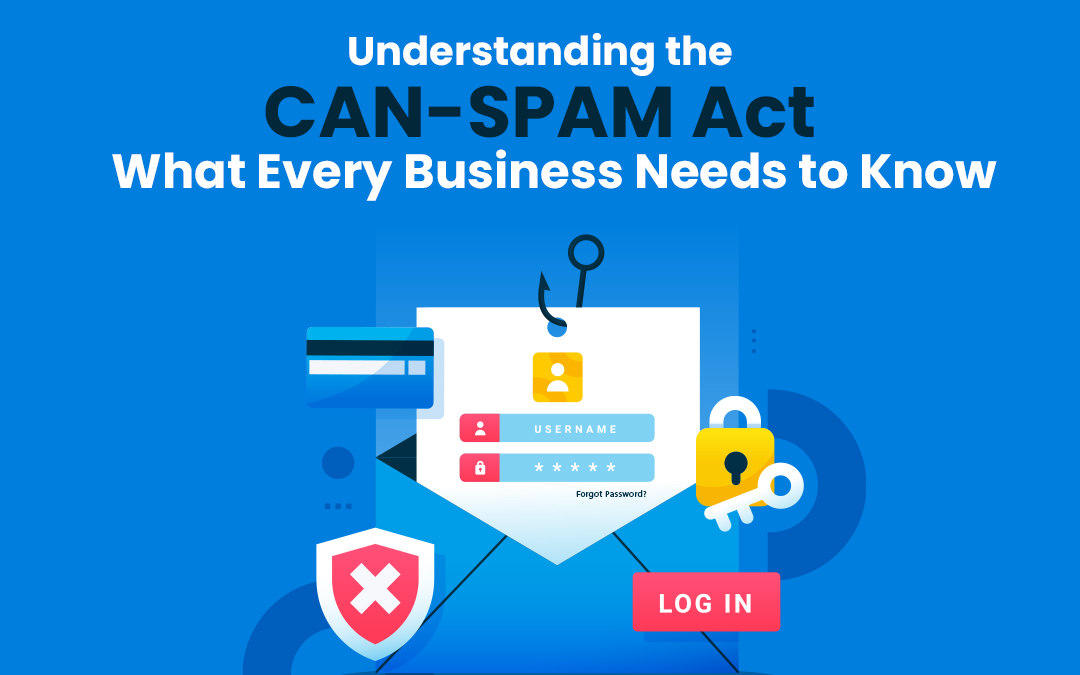
Do you feel restricted while choosing a proper email marketing platform for your business? Choosing the right platform is quite a challenge because there are so many options to meet the goals and needs. The choice of a suitable platform, whether a new company or an already established brand, is decisive for customer relations, conversion rates, and stability.
It will also make the campaign creation much easier, yield more relevant data concerning informative insights, and save time. Here are the different ways that are important in this decision-making process.
1. Define Your Business Needs
As you go on to define your business needs, the size of your audience comes into view. How many subscribers your business currently has will give you an idea of which email marketing platform will suit your business. Some offer great scalability for small businesses, while others are designed for big enterprises with an extensive customer base.
Define your goals next. Are you focused on customer retention, lead generation, product promotions, or newsletters? Different platforms are equipped with special features that cater more precisely to the goals mentioned above. Lastly, consider what email messages you will mail out: is it a regular newsletter, transactional email, or automated email campaign? Knowing what email strategy you want to implement will help you find the right email marketing platform.
These identifiable factors will help you identify a platform that suits your goals and enables you to derive the intended results. That said, if you find it challenging to define your business need when choosing an email marketing platform, you can consider the email marketing service provider. Their team of professionals will analyze your business, define your needs, and help you choose the best email marketing platform.

2. Assess Email Deliverability
The success of your campaigns is all about deliverability, and you need to focus on platforms that guarantee high deliverability rates. While choosing an email marketing platform, focus on those with a good reputation with ISPs (Internet Service Providers).
A good reputation helps your emails land in the inbox instead of the spam folder, improving engagement rates and campaign performance. Additionally, find a platform that offers tools to monitor deliverability and track inbox placement proactively. Such tools let you identify potential issues before they happen so that you can make the required changes for better performance. They also help you optimize your email campaigns and maintain a clean sender reputation- key to long-term success.
3. Examine Usability
When evaluating an email marketing platform, ensure its usability is smooth and doesn't involve technical knowledge. Search for a drag-and-drop editor integrated into the email creating tool, enabling you to create well-formatted emails that should not necessarily be coded.
Many samples are also advantageous since they will minimize your time developing different types of emails or templates. Another feature is the automation setup of a given platform, where you can easily create and add on the automation workflow. This will prove useful because an email campaign will eliminate time and simplify your work. Also, consider the customer support that the platform provides.
That means it should have blogs where you can reach the support team through chat, email, or phone support whenever you want. This can help you select a platform that adds value to your email marketing experience by simplifying the process.

4. Evaluate Key Features
While choosing an email marketing platform, pay more attention to features that fit your needs. Automation is necessary, so consider drip campaigns, autoresponders, and triggered emails.
Examples include welcome emails and reminders of abandoned carts. Such tools will help organize your communication and engage an audience. Other key features include list segmentation, by which you are able to address groups of contacts with either behavioral, demographic, or historical triggers that make your messages relevant.
Personalization is key; look for a platform that will provide dynamic content personalization by naming the recipients, referring to their location, or using past purchase behavior. Equally important are analytics and reporting tools, which give insight into open rates, click-through rates, bounce rates, and other engagement metrics to help you refine your strategy.
A/B testing is another feature to look for, enabling you to test different subject lines, content, and send times to optimize performance. Finally, prioritize deliverability rate, ensuring your emails land in inboxes, not spam folders.
5. Analyze Integration Capabilities
In choosing an email marketing platform, ensure it has strong integrations with your current tools. Also, the integration with the CRM system will enable you to synchronize all customer data and, later on, when creating your email campaigns, be very targeted with more detailed insights into your customers.
Consider how well this platform will play with your other marketing tools: analytics, form builders, and landing page creators. Smooth integration ensures productivity at higher efficiency and makes one big marketing ecosystem even better.
By ensuring the new tool fits in line with those you were already working with, you build better results and a smoother experience of everything happening altogether. Additionally, an integrated system is updated in real-time, meaning your data is up-to-date and precise. Of course, that saves time on data entry or navigating between platforms. In the long run, a well-integrated system supports a more agile and effective marketing approach.

Conclusion
Selecting the proper email marketing service to take care of your account is vital to the success of your business. After choosing to define your needs, comparing the important aspects, and confirming compatibility, you can identify the right platform for investment. With usability, deliverability, and automation campaigns at your fingertips, find better ways to engage with your audience. Applying the proper techniques, you will achieve your primary goal—deliver your message to your target audience and create loyal customers. It is also important to check that the platform matches your company’s size and growth aspirations for sustainability. Don’t wait any longer to expand your options on how you can go even further with your email marketing!
Share this post
Leave a comment
All comments are moderated. Spammy and bot submitted comments are deleted. Please submit the comments that are helpful to others, and we'll approve your comments. A comment that includes outbound link will only be approved if the content is relevant to the topic, and has some value to our readers.



Comments (0)
No comment